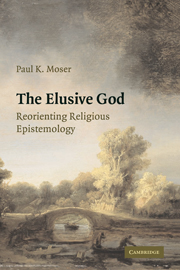2 - Knowing as Attunement
Published online by Cambridge University Press: 29 July 2009
Summary
We have seen in Chapter 1 that volitional knowledge of a perfectly loving God's reality would be significantly different from our knowing, for instance, that pomegranates exist. Pomegranates are wonderful in many ways, but a God worthy of worship would be even more wonderful in even more ways. Questions about knowledge of God's reality always invite questions about what kind of God we have in mind.
Are we talking about the tenuous absentee God of deism or minimal theism? Or, alternatively, are we talking about the authoritatively convicting and transformingly loving God of Abraham, Isaac, Jacob, and Jesus? The latter God claims to be the gracious but elusive personal God who is a consuming fire against selfishness and all other evil. As a result, this God, even if incognito, claims to love humans in a way that requires divine suffering for us, even in the crucifixion of God's Son, in order to remake us noncoercively in the divine image of self-giving love toward all persons, including enemies.
This chapter identifies major obstacles, so-called “idols,” that block recognition of a perfectly loving God's reality. Skeptics may desire to invoke such obstacles as defeaters of evidence of divine reality, but we'll see that such a desire would be misguided. This chapter also elucidates some reasonable divine purposes that would motivate divine elusiveness.
- Type
- Chapter
- Information
- The Elusive GodReorienting Religious Epistemology, pp. 83 - 143Publisher: Cambridge University PressPrint publication year: 2008

